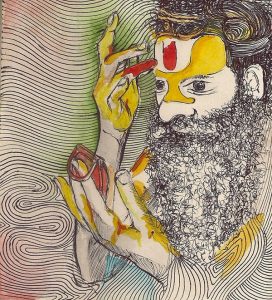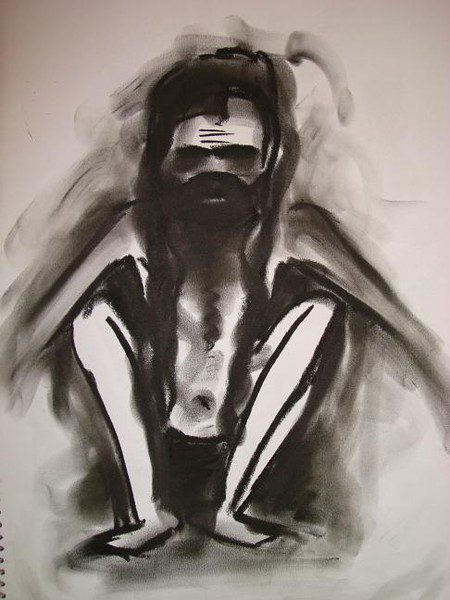The sadhus are of many kinds. Soumya meets one who lived in a tiger resort, deep in the forest, exclusively for Different Truths.
 They are the original ‘drop out, turn on, tune in’ people, long before beatniks, flower power and hippies, they were the guys ‘on the road’ chilling out with chillums, living on the largesse or gullibility of society, communing with God knows who, and living a blissfully unattached life. They are the sadhus, monks, sanyasis, hermits, pirs, faquirs, bauls, auls, darvesh, whatever you call them, ubiquitous all over our ancient land, travelling freely, even ignoring international boundaries. I had always been fascinated by them and wanted to know what makes them tick.
They are the original ‘drop out, turn on, tune in’ people, long before beatniks, flower power and hippies, they were the guys ‘on the road’ chilling out with chillums, living on the largesse or gullibility of society, communing with God knows who, and living a blissfully unattached life. They are the sadhus, monks, sanyasis, hermits, pirs, faquirs, bauls, auls, darvesh, whatever you call them, ubiquitous all over our ancient land, travelling freely, even ignoring international boundaries. I had always been fascinated by them and wanted to know what makes them tick.
Some were clearly charlatans, some beggars, some seemed to be wanted criminals on the run, and most seemed to be motivated by greed, need or laziness.
I, therefore, often struck up a conversation with those I came across and was mostly disappointed with whatever insights I got. Some were clearly charlatans, some beggars, some seemed to be wanted criminals on the run, and most seemed to be motivated by greed, need or laziness.
Many were a peddler of psychosomatic substances, like a colourful one in a small town whom you had to approach saying ‘Jai Siya Ram’ and the response would be ‘Bolo dayalu’ and the transaction would take place.
Then there was this fierce looking gentleman in Himachal, who surprised me by talking in perfect Bangla, and confided that after having led a riotous and delinquent life in our premier university…
Then there was this fierce looking gentleman in Himachal, who surprised me by talking in perfect Bangla, and confided that after having led a riotous and delinquent life in our premier university, his results left no alternative except becoming a sadhu, thus saving an embarrassing interview with his fire breathing father, and getting him in the bargain an enviable and profitable fan following among female European tourists, with whom he could communicate in English, French, and German.
I also discovered that many were part time sadhus, who were farmers or farm labour during the season, and travelled the country on public charity in the offseason, supplementing their income at the same time.
But the one who impressed me most was a sadhu who lived deep in a forest in a tiger sanctuary, the only human to being not to be relocated from the core area and deeply revered by the local villagers, who had provided us shelter during a memorable adventure, of which I have written earlier.
He told us his story over a small bonfire in a cave in the middle of a forest, while peacefully smoking a shared post dinner country pipe, or chillum.
His story seemed unique. He told us his story over a small bonfire in a cave in the middle of a forest, while peacefully smoking a shared post dinner country pipe, or chillum. This is his story.

A middle-class family man, running a small business in a small town, all he wanted was peace, which continued to elude him in the usual strife of our daily existence. He also realised that neither his family nor his business really needed him. So one fine day, he called his family, distributed his assets, wound up his affairs, bid everyone farewell, and left home for a life on the roads without any assets or possessions beyond the basics he could carry, and no money except what he would get as charity from strangers. As suspected, no one really missed him.
He joined a wandering band of sadhus, called an akhara, after some initiation rites, and lived a happy life on the roads for a while
He joined a wandering band of sadhus, called an akhara, after some initiation rites, and lived a happy life on the roads for a while, visiting the char dhams, or four pilgrimage destinations, on the four corners of our country. But soon he realised that the strife of society afflicts the akhara as well, and petty squabbles, egos, proximity to the chief, rising within the ranks, disturbed his peace, just as it was in the outside world.
The sadhu realised that the troubles of his own family is being replaced by those of the whole village.
 He, therefore, left the band and went solo, wandering around alone, and staying by some river or near some village that caught his fancy. One must wonder at the charity of poor rural folk who happily support a stranger in their midst. But charity too comes with a price tag, and there are no free meals. The villagers who fed him also came to him with their troubles, looking for advice, solace, or just a sympathetic ear. The sadhu realised that the troubles of his own family is being replaced by those of the whole village.
He, therefore, left the band and went solo, wandering around alone, and staying by some river or near some village that caught his fancy. One must wonder at the charity of poor rural folk who happily support a stranger in their midst. But charity too comes with a price tag, and there are no free meals. The villagers who fed him also came to him with their troubles, looking for advice, solace, or just a sympathetic ear. The sadhu realised that the troubles of his own family is being replaced by those of the whole village.
That is when he decided to escape again, to even more remote parts, till finally he settled in this deep forest devoid of human habitation. He now lived simply as man did ten thousand years ago, living off the land, barely leaving a mark, completely in harmony with nature, in absolute solitude and perfect peace. His few needs were taken care of by the forest dwellers on the outskirts during his rare forays among them. The wild animals did not disturb him as he did not disturb them.
Here was a real sadhu at last, in the tradition of our ancient rishis, who did not follow any rituals or dogma, but sat quietly in a forest by himself and contemplated on the nature of the universe by himself, aided by some mind consciousness expanding herbs.
This was essential India.
©Soumya Mukherjee
Photos from the Internet





 By
By
 By
By
 By
By
 By
By
Rare Sadhu!
In the hustle and bustle of daily life one wishes to go away like this!